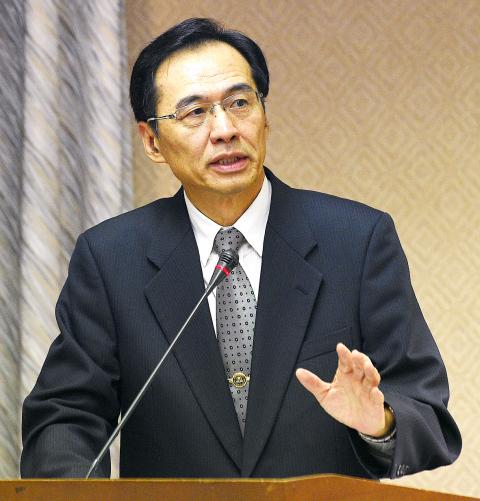The appointment of National Immigration Agency Director-General Mo Tien-hu (莫天虎), who has an intelligence background, to the position of Chinese Nationalist Party (KMT) secretary-general has set some tongues wagging.
The KMT’s Central Standing Committee approved the appointment on Wednesday. Mo, who has applied for retirement, is slated to take over the position with the KMT on Monday.
Mo has worked at the Ministry of Justice’s Investigation Bureau as director of the Taipei City Field Office Shihlin Station, Hualien County Station and Tainan City Station, the deputy director of the bureau’s Domestic Security Field Office, deputy director of the Kaohsiung City Field Office, director of the Tainan City Field Office and director of the Domestic Security Field Office.

Photo: Chen Chih-chu, Taipei Times
In a goodbye statement issued to his colleagues on Wednesday, Mo said the new role is expected to be “full of difficulties and challenges, which would amount to jumping into a fire pit.”
However, fawning over the powerful is not his thing, he said.
“Offering help when someone is in trouble is what I love doing. I always believe that achievements can only be made with a bit of foolish gung-ho, which I have,” Mo said.
A dedicated Christian, Mo said, “facing an unknowable future, I will give it all to God.”
The appointment surprised the media, KMT members and lawmakers, who said they are unfamiliar with Mo, who has never worked in the party system, and are therefore skeptical about his ability to coordinate the party and the caucus.
KMT committee member Yao Chiang-lin (姚江臨) said it is within the chairperson’s authority to make personnel appointments, but based on experience, it does not work well if the party secretary-general is someone who had no direct experience of working with the party.
KMT caucus whip Lin Te-fu (林德福), who doubles as the party’s deputy secretary-general, said although Mo had worked mostly with investigative units, he could facilitate communications with the party lawmakers by interacting with them more.
However, some joked that Mo’s intelligence background would probably make lawmakers and committee members nervous.
KMT spokeswoman Wang Hong-wei (王鴻薇) yesterday said party members are all in the same boat and should not criticize the party.
Media personality Clara Chou (周玉蔻) on Wednesday wrote on Facebook that the appointment reminded her of the Chiang Kai-shek (蔣介石) era, during which intelligence officials were also party heavyweights greatly depended upon by Chiang.
Democratic Progressive Party (DPP) Legislator Wang Ting-yu (王定宇) said that while society still fears intelligence is being used for political purposes, Hung’s appointment of an intelligence official to KMT secretary-general is reconnecting the intelligence system to the party.
“This is [democratic] regression,” he said.
DPP Legislator Pasuya Yao (姚文智) said Mo’s appointment was a surprise to him, but added that with Mo’s background, he could be expected to conduct a thorough examination of the KMT’s assets, which some suspect might have been embezzled by private individuals.
Former Deputy Legislative Speakers’ Office director Chiao Cheng-chung (喬正中), who has been one of Hung’s aides for almost 20 years, had also worked as an agent with the investigation bureau.
Chen Hang-sheng (陳杭升), who was appointed early last month by Hung to serve as the head of the KMT’s Administration and Management Committee, also has an intelligence background.
The appointment has spawned some discussion within the party as to whether Hung is to rely on Chen’s expertise to discipline the party.

REPORT: Taipei has expressed an interest in obtaining loitering munitions matching the AeroVironment Switchblade 300 or the Anduril Altius-600, ‘Foreign Policy’ said Taiwan is seeking US-made kamikaze drones in an apparent concession to pressure from Washington to focus on asymmetric capabilities to defeat or deter a Chinese attack, Foreign Policy said in a report on Wednesday. Taipei has expressed an interest in obtaining AeroVironment Switchblade loitering munitions or other devices with similar capabilities, it said, citing four sources familiar with the matter commenting on condition of anonymity. The Switchblade 300 is a tube-launched drone designed for attacking ground troops, while its larger sibling, the Switchblade 600, could be used to destroy tanks and entrenched troops. Ukraine has utilized both systems extensively in its fight against

Police officers yesterday morning apprehended the prime suspect of a triple homicide case, after raiding the suspect’s hideout in Taichung. They transported the suspect to New Taipei City for questioning and recorded his statement last night. The suspect, identified as a 24-year-old man surnamed Chang (張), is believed to have used his hands to strangle his wife, surnamed Chen (陳), 29, along with his three-year-old son from a previous marriage and his wife’s mother, 69. The three dead bodies were wrapped in blankets when they were discovered inside their apartment in New Taipei City’s Sanchong District (三重) on Saturday. Chang was holding a

Hungarian Member of Parliament Tompos Marton said he considers Taiwan to be a better alternative to China as a strategic partner. Marton, who is the vice president of the opposition Momentum Party, made the remarks in an interview with the Central News Agency on Sunday. He draped a Republic of China flag across his shoulders to protest Chinese President Xi Jinping’s (習近平) visit to the capital city, Budapest, on Thursday last week, and openly voiced support for Taiwan on social media. He said in the interview that he wanted to remind the world that there were alternatives to China, and that “Taiwan has

A female physician at New Taipei City’s Shuang Ho Hospital was bullied and made to work for 32 consecutive hours by a senior colleague while pregnant before later having a miscarriage, an internal investigation found, the hospital said on Monday. The perpetrator has been removed from his post, the hospital said. The attending physician in the hospital’s Medical Imaging Department, identified by the pseudonym Y, earlier on Monday told reporters that she had been bullied by a male senior colleague who arranged shifts in her department. In January, shortly after she became pregnant, Y asked the department director if she could avoid overnight